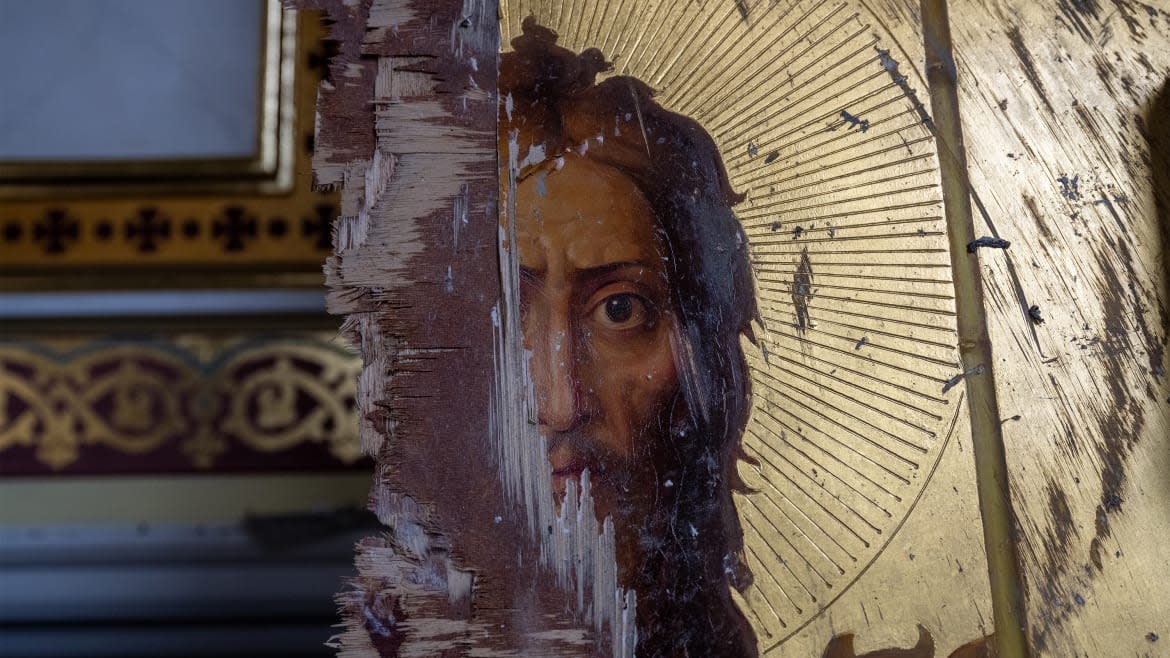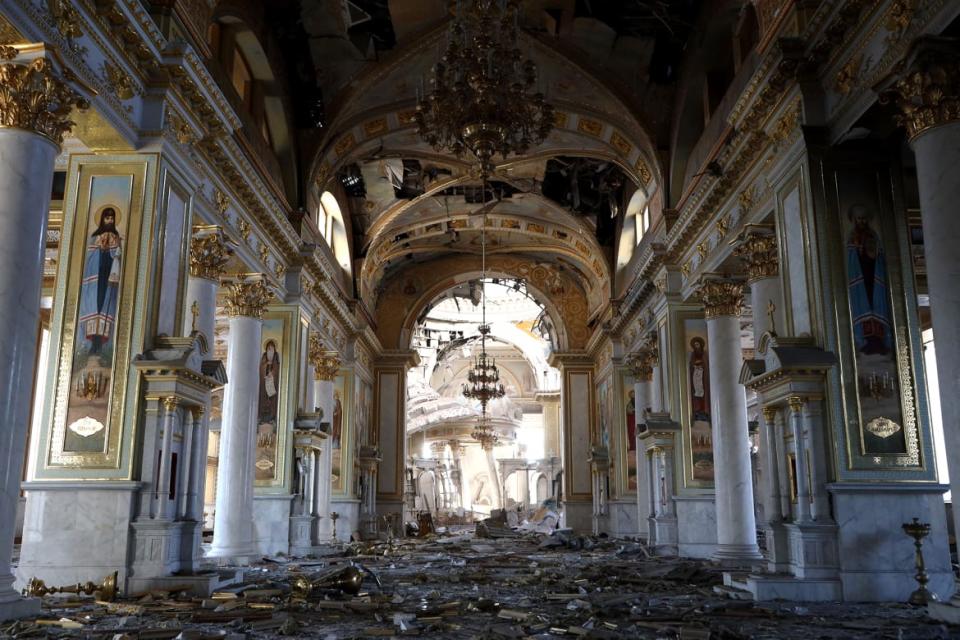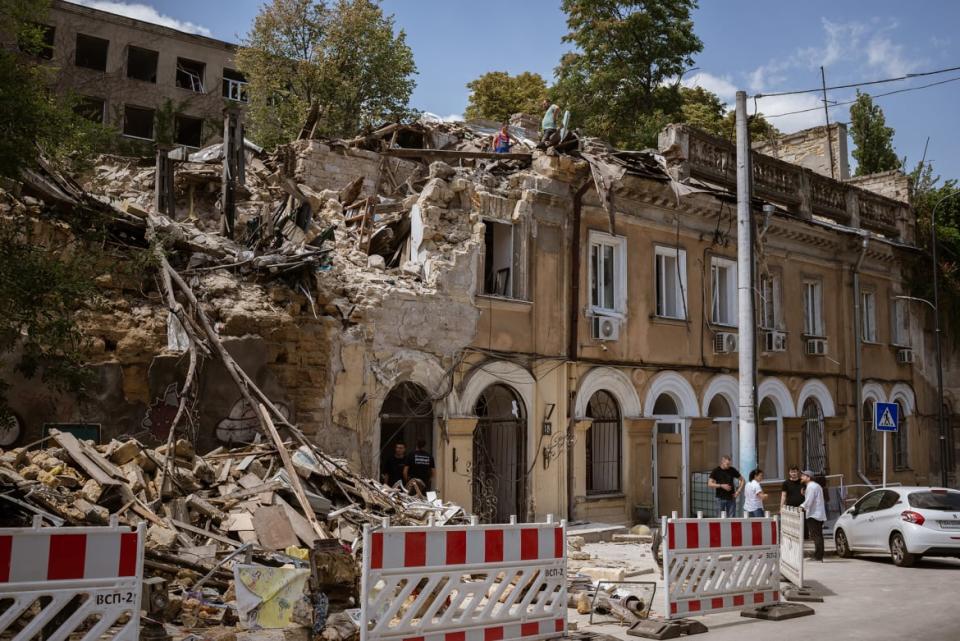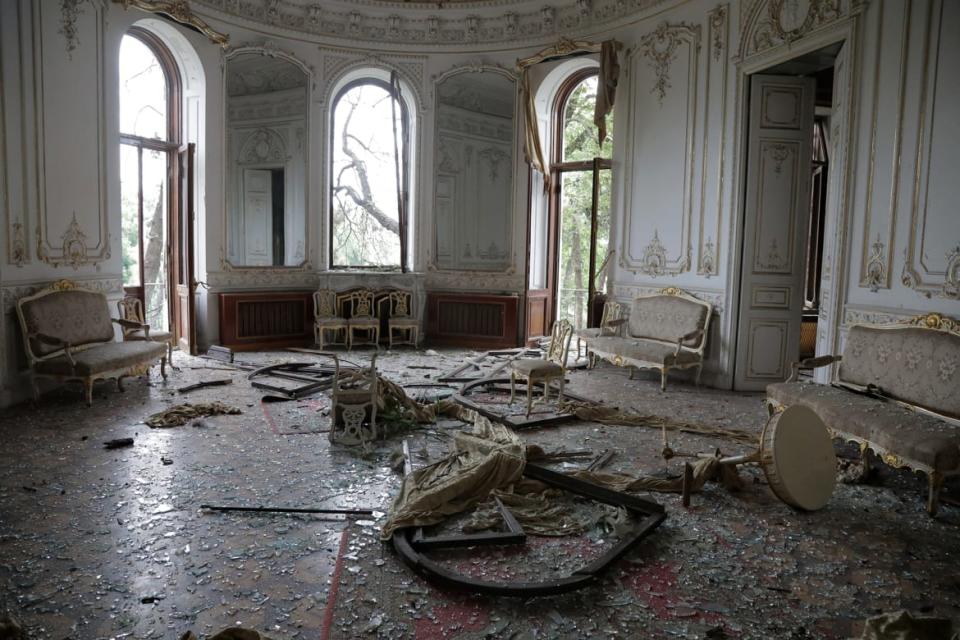Treat Russia’s Assaults on Ukrainian Culture as War Crimes

- Oops!Something went wrong.Please try again later.
In three days of bombing, Russia has again damaged cultural sites in Ukraine, this time in the historic city of Odesa—which UNESCO recently added to its World Heritage List, invoking a rarely used emergency inscription to add the city and calling it “the duty of all humanity to protect it.”
Russian bombs hit the Odesa Literary Museum, the Odesa Archaeological Museum, and the Museum of Western and Oriental Art, according to news reports. The Mykolaiv Regional Center for Folk Art and Cultural and Educational Work was completely destroyed. The Transfiguration Cathedral, one of the most important churches in Odesa, was also badly damaged.
The Russian Federation’s attacks on civilians and civilian infrastructure has already led the International Criminal Court (ICC) to issue arrest warrants for Vladimir Putin for war crimes, specifically over the unlawful deportation of Ukrainian children.
My Year of Living Under Constant Attack in Kyiv
In addition, a report by the Independent International Commission of Inquiry on Ukraine documents further war crimes and human rights violations by Russian forces, including sexual violence, torture, and summary executions—along with unlawful attacks against energy infrastructure, schools, residential buildings, and medical facilities.
Ukraine has set up special units that follow troops into liberated areas, documenting war crimes and human rights violations in real time, and collecting evidence to support prosecutions. Many Western governments, including the United States, provide technical support and advice to the war crimes units and to the chief prosecutor who oversees war crimes investigations.

The damaged interior of the Transfiguration Cathedral as a result of a Russian missile strike in Odesa, Ukraine.
But one type of war crime has yet to receive the same attention—the wide-scale assault on Ukraine’s cultural infrastructure, which has damaged or destroyed hundreds of culture centers, including some of the country’s most important museums, libraries, and religious worship and heritage sites.
UNESCO’s figures confirm the scale of cultural destruction, indicating that as of this month, 270 cultural sites had been damaged or destroyed since the beginning of the war.
It is not yet known how many smaller cultural centers have been attacked or lost, but by November 2022, PEN Ukraine had documented the complete loss of or damage to more than 500 cultural objects since the invasion started.
The obliteration of cultural infrastructure and the ongoing attacks are war crimes and clear violations of the cultural rights of Ukrainians. Importantly, the destruction of cultural venues large and small will undermine the key role that culture will play in healing and restoring Ukraine when the war ends.
The NATO Summit Proved the Alliance Is Strong and Still Has Ukraine’s Back
The Losova Palace of Culture in the Kharkiv region is just one poignant example of Russia’s assault on cultural venues. Extensively damaged by a Russian missile in spring 2022, the nondescript brown building was the “heart of our urban community,” said Victor Harashchuck, the director. With its small theater and library, the Palace of Culture hosted concerts, plays and children’s programs. Harashchuck cannot understand why the center was targeted: “There is no military here, nothing related to the military.”
The Chernihiv Regional Youth Library—established in 1978, a beautiful red structure, constructed in the Gothic Revival style and with a collection of 62,000 books—was destroyed on March 11, 2022, when Russian forces dropped a 500 kilogram bomb on it. The All Saints Skete of Sviatohirsk Lavra in the Donetsk region, constructed of pine wood and adorned with carvings, was repeatedly attacked in April and May 2022. A fire after Russian shelling on June 4, 2022, completely destroyed the church.

The nineteenth-century Porro House after being damaged by the missile attack in Odessa, Ukraine on July 24, 2023.
Cultural property is protected under international human rights and humanitarian law. The 1954 Hague Convention, in the event of armed conflict, explicitly sanctions crimes against cultural property, recognizing that the loss of cultural infrastructure causes pain and suffering to communities who risk losing their heritage, identities, language, and ability to engage in cultural life. Parties to the Convention, which includes the Russian Federation, must respect cultural property during conflict and refrain from any “act of hostility” toward it.

The interior of the House of Scientists shows the damage from a Russian missile attack on July 23, 2023 in Odesa, southern Ukraine.
In 2016, the U.N. Human Rights Council stated in a resolution that each cultural violation “constitutes an aggravating factor in conflict and a major obstacle to dialogue, peace, and reconciliation.”
Putin’s Eurotrip Options Slashed With Another Vow to Arrest Him
The Ukrainian government, its people, and the international community have rallied to protect their cultural heritage and property by moving precious artifacts to relative safety, and developing restoration plans. Efforts are underway to ensure that all cultural property is marked to facilitate its recognition and to support Ukrainian military efforts to protect existing cultural infrastructure. In addition, the international community has supported writers, artists, and others who produce culture, helping some to flee the war and supporting others who remain in Ukraine.
While these efforts to protect culture are critically important, they must be accompanied by accountability for its destruction. Ukraine and the international community must urgently support a comprehensive approach to accountability by fully investigating attacks on culture, gathering the necessary evidence for prosecution and identifying perpetrators.
These are cultural crimes, and the perpetrators must face justice.
Liesl Gerntholtz, a human rights lawyer, is the founding director of PEN America’s PEN/Barbey Freedom to Write Center.
Get the Daily Beast's biggest scoops and scandals delivered right to your inbox. Sign up now.
Stay informed and gain unlimited access to the Daily Beast's unmatched reporting. Subscribe now.

